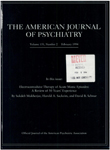Pattern of recurrence of illness after recovery from an episode of major depression: a prospective study
Abstract
OBJECTIVE: This study assessed prospectively the pattern of recurrence of illness after recovery from an episode of major depression. METHOD: Seventy-two patients who had recovered from an episode of primary, nonbipolar, nonpsychotic major depression were evaluated bimonthly with the Comprehensive Psychopathological Rating Scale for a period ranging from 20 to 108 months (median = 66 months). New ("prospective") episodes were ascertained with a structured diagnostic interview. The probabilities of remaining well after the index episode and after the first prospective episode were assessed by the life-table method. The severity and duration of prospective episodes and the index episode were compared by linear regression analysis. RESULTS: The probability of remaining well after recovery from the index episode was 76% at 6 months, 63% at 1 year, and 25% at 5 years. The risk of recurrence was lower among patients receiving prophylactic treatment with antidepressants and/or lithium and among those with histories of fewer than three previous episodes. The probability of remaining well was significantly lower 2 years after the first prospective episode than 2 years after the index episode. A pattern of increasing severity from the index episode to the first, second, and third prospective episodes was observed and was not affected by treatment. CONCLUSIONS: Major depression has a high rate of recurrence, even when bipolar and psychotic cases are excluded. The highest rate is observed during the first months after recovery from an episode. Prophylactic drug treatment reduces the risk of recurrence but apparently does not affect the trend toward increasing severity of subsequent episodes.
Access content
To read the fulltext, please use one of the options below to sign in or purchase access.- Personal login
- Institutional Login
- Sign in via OpenAthens
- Register for access
-
Please login/register if you wish to pair your device and check access availability.
Not a subscriber?
PsychiatryOnline subscription options offer access to the DSM-5 library, books, journals, CME, and patient resources. This all-in-one virtual library provides psychiatrists and mental health professionals with key resources for diagnosis, treatment, research, and professional development.
Need more help? PsychiatryOnline Customer Service may be reached by emailing [email protected] or by calling 800-368-5777 (in the U.S.) or 703-907-7322 (outside the U.S.).



